Biohacking sleep for peak performance – how to do it effectively?

Biohacking sleep for peak performance – how to do it effectively? Sleep is an essential component of overall health, mental clarity, and physical performance. Yet, according to the Centers for Disease Control and Prevention (CDC), around one in three adults do not get enough sleep on a regular basis. Over time, poor sleep can lead to weakened immune function, increased stress levels, and a decline in cognitive performance. Here is where biohacking comes into play. Biohacking involves using evidence-based techniques and technologies to optimize the body’s functions, including enhancing your sleep quality. When you biohack your sleep, you intentionally adjust your circadian rhythm, bedroom environment, nutrition, and daily habits so that you can fall asleep faster, achieve deeper sleep, and wake up feeling truly refreshed. The goal is not just to rest, but to optimize your sleep to unlock peak performance in your personal and professional life. In this article, we’ll look at why biohacking sleep is so critical for success, how you can harness various strategies such as biohacking sleep light and biohacking sleep nutrition, and what tools and techniques you can use to effectively integrate these changes into your routine. Join our Online Workshops: Understanding the foundations of sleep The circadian rhythm and sleep-wake cycle The circadian rhythm is your body’s internal 24-hour clock. It regulates the sleep-wake cycle, influencing when you feel alert, when you feel sleepy, and even when certain hormones like melatonin are released. Think of it as your body’s natural way of keeping time. Aligning with your natural sleep-wake cycle can significantly improve your sleep quality. Disruptions—such as working late, irregular sleep schedule, or heavy exposure to artificial light at night—can make it harder to fall and stay asleep. Too much blue light from electronic devices, stimulants like caffeine, and shift work are frequent culprits that alter your body’s circadian rhythm. Biohacking your sleep means recognizing these disruptors and taking steps to limit their influence. Sleep stages and their significance Sleep occurs in several stages—light, deep (slow-wave), and REM. Both deep sleep and REM are crucial for memory consolidation, muscle recovery, and daytime alertness: Deep sleep (slow-wave sleep): Often regarded as the most restorative stage. It’s also the phase that biohacking deep sleep strategies aim to increase, as improvements here can accelerate physical recovery and enhance overall well-being. REM sleep: Important for memory and learning, REM sleep helps your brain process and consolidate new information. Sleep deprivation impact: According to research from the National Institutes of Health, short-term sleep deprivation can lead to reduced attention, poorer decision-making, and an overall decline in mental performance. Chronically sleep-deprived individuals risk serious health issues like cardiovascular diseases and mood disorders. Setting up a solid sleep enviroment One of the most fundamental considerations is the choice of mattress and pillows; a comfortable bed that supports your spine and aligns with your preferred sleeping position can help reduce nighttime awakenings. Room temperature is another key factor, and many experts suggest keeping the bedroom between 60–67°F (15–19°C). This cooler range helps regulate body temperature, making it easier to fall asleep and remain asleep throughout the night. Light control also plays a major role in signaling the body to produce melatonin. Using blackout curtains or wearing a sleep mask can effectively block artificial light, maintaining a dim ambiance when it’s time for bed. Beyond these basics, the way you manage light exposure can significantly influence your circadian rhythm. Gaining 15–30 minutes of natural sunlight exposure each morning helps reset your internal clock, prompting alertness during the day and tiredness when evening arrives. Limiting blue light at night is equally important because screens on electronic devices emit wavelengths that suppress melatonin production. Wearing blue light-blocking glasses or installing screen filters can reduce this impact, particularly in the hour before bedtime. Some people also employ smart lighting solutions designed to mimic sunrise and sunset. By gradually dimming in the evening and brightening in the morning, these lights reinforce a consistent sleep cycle and help align your body’s natural rhythms. Biohacking sleep nutrition Foods and supplements for better sleep Nutrition plays a major role in how quickly you fall asleep and the quality of your deep sleep: Key nutrients: Foods rich in tryptophan (e.g., turkey, pumpkin seeds), magnesium (e.g., leafy greens, nuts), and vitamin D (from sunlight or supplements) help promote overall health and facilitate the body’s production of melatonin. Supplements like melatonin: Melatonin supplements are widely used to promote sleep, though they work best for short-term circadian rhythm corrections (e.g., jet lag). Always consult a healthcare professional before starting any new supplement routine. Caffeine and hydration: If you love coffee or tea, try consuming it at least 6–8 hours before bedtime to prevent caffeine from interfering with your sleep cycle. Staying hydrated is important, but large amounts of fluid close to bedtime could cause nighttime trips to the bathroom, disrupting restful sleep. Timing meals for optimal sleep Avoid large meals close to bedtime: Heavy or spicy meals late in the evening can lead to indigestion and poor sleep quality. Aim for a lighter dinner at least 2–3 hours before you go to bed. Biohacking less sleep vs. nourishing better sleep: Some attempt biohacking less sleep by drastically cutting sleep hours. This may be beneficial in extreme circumstances (e.g., short-term deadlines), but it often has repercussions on mental health, cognitive ability, and physical recovery. Instead, focus on improving your sleep depth and efficiency through proper nutrition, so you feel more energized without sacrificing hours of rest. Routine and relaxation strategies Consistent sleep schedule Go to bed and wake up at the same time every day: This regularity fortifies your body’s natural sleep-wake cycle, making it easier to fall asleep and stay asleep. A short 20-minute power nap can rejuvenate you without significantly disrupting your sleep schedule. However, long or late-afternoon naps may interfere with nighttime sleep hygiene. Stress management and relaxation techniques Stress is a common sleep disruptor. Incorporate relaxation methods into your pre-sleep routine to signal the mind and body that it’s
Biohacking your brain’s health: A guide to optimizing cognitive performance
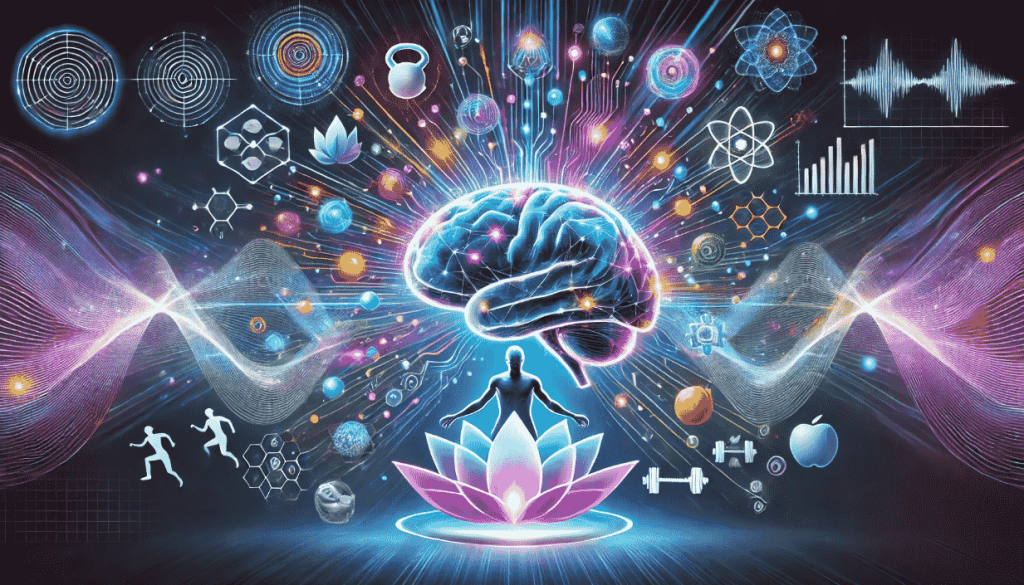
Biohacking your brain’s health: A guide to optimizing cognitive performance Biohacking your brain’s health is a concept that merges the latest scientific insights and self-improvement strategies to help you think faster, maintain focus, and protect your cognitive function as you age. While “biohacking” initially gained prominence in the do-it-yourself biology movement, it has evolved into a broader approach that includes nutrition, technology, exercise, and lifestyle changes—all aimed at optimizing your mind’s performance. In this article, we will explore the core principles of biohacking your brain, diving into practical techniques, advanced methods, and the most up-to-date research on how to boost your brain health. If you’ve ever wondered how to improve memory, increase mental clarity, and enhance overall brain function, read on. Join our Online Workshops: What does “biohacking your brain” mean? Biohacking your brain involves applying experimental, personalized, and research-based interventions to optimize your cognition. Biohackers believe that by modifying environmental, nutritional, and technological factors, you can enhance learning and memory, reduce brain fog, and even slow down age-related cognitive decline. From “brain biohacking exercises” like memory games to more cutting-edge techniques such as transcranial stimulation, these approaches target areas of the brain that govern focus, problem-solving, and long-term mental health. Key principles of brain health Balanced nutrition A balanced diet is crucial to keep your brain functioning at its best. Diets high in fruits, vegetables, whole grains, and lean protein—like fish—provide essential nutrients that help maintain neuron health and reduce the risk of neurodegenerative diseases. For instance, the MIND diet combines elements of the Mediterranean and DASH diets, emphasizing green leafy vegetables, berries, nuts, and fish rich in omega-3 fatty acids. Research suggests that adherence to the MIND diet can lower the risk of Alzheimer’s disease by up to 53% in strict followers. Quality sleep for cognitive function Getting at least 7.5 to 8 hours of quality sleep each night is one of the simplest, yet most powerful ways to boost your brain. During sleep, your brain flushes out toxins, consolidates memories, and regenerates nerve cells. Chronic sleep deprivation can lead to impaired memory and reduced focus, contributing to long-term cognitive impairment. The role of physical activity Physical exercise elevates blood flow to the brain, increasing oxygen and nutrient delivery to brain cells. Regular physical activity—whether it’s high-intensity interval training, strength training with free weights, or moderate aerobic workouts—supports the release of brain-derived neurotrophic factor (BDNF), a neurotrophin that promotes the growth of new neurons and improves neural connections. Stress management Stress (biology) significantly impacts cognitive abilities and memory. Chronic stress leads to higher levels of cortisol, a hormone that can damage the hippocampus (an area of the brain critical for memory) when elevated for extended periods. Techniques such as mindful meditation, breathing exercises, or even adopting a new hobby can help reduce stress and protect your cognitive function. Biohacking brain technology and approaches Tracking cognitive performance One of the earliest steps in any biohacker’s journey is to quantify their current cognitive performance. Wearables and smartphone apps can measure sleep patterns, heart rate variability, and even track daily stress levels. By collecting real-time data, you can identify trends that may be impacting your cognition and then fine-tune your lifestyle accordingly. Brain training games and exercises “Brain biohacking exercises” often include puzzle games, memory tests, and language apps designed to challenge your working memory and executive function. A pilot study published in 2019 found that daily use of brain training apps could lead to short-term improvements in memory and attention, although more clinical trials are needed to confirm long-term efficacy. Emerging tech: Neurofeedback and beyond Neurofeedback devices and transcranial electrical or magnetic stimulation (tDCS, TMS) are gaining attention in the biohacking community. These technologies claim to help improve focus, learning, and mood by delivering mild currents or magnetic pulses to targeted areas of the brain. While some human studies have shown promising results, it’s critical to weigh ethical considerations, potential adverse effects, and consult a healthcare professional before using them. Building a brain-friendly diet Understanding the MIND diet The MIND diet emphasizes foods like green leafy vegetables, nuts, whole grains, beans, poultry, olive oil, and fish. Studies show a strong correlation between the MIND diet and a lower risk of developing Alzheimer’s disease, partly due to its emphasis on antioxidants and anti-inflammatory foods that protect neurons from cellular damage. Fill up on omega 3’s Omega-3 fatty acids, found in fish oil and certain seeds (chia, flax), are essential for maintaining brain cell membrane integrity. Some research indicates that diets high in omega-3 fatty acids can help improve memory, reduce inflammation, and potentially reduce the risk of dementia. Consider fatty fish like salmon or sardines, or opt for fish oil supplementation if you struggle to consume enough through diet alone. Curcumin (turmeric) and dietary supplements Curcumin, the active compound in turmeric, is a potent antioxidant that may help reduce inflammation and oxidative stress in the brain. When combined with piperine (found in black pepper), curcumin’s bioavailability skyrockets. Additional supplements such as vitamin D, magnesium, or even nootropics like L-theanine can give your brain a gentle boost, but be mindful of research-backed doses and consult a healthcare professional for personalized advice. Managing glucose levels Your brain runs primarily on glucose, but excessive sugar spikes can lead to insulin resistance and chronic inflammation. By opting for complex carbohydrates, practicing intermittent fasting, or balancing macronutrients, you can avoid harmful blood sugar swings that may impair cognition over time. Lifestyle changes that optimize cognitive abilities Sleep 8 hours Consistently getting around 8 hours of sleep is associated with better mental clarity, faster learning, and a reduced risk of age-related neurodegenerative diseases. During sleep, your glymphatic system clears out metabolic waste from the brain, preventing the buildup of amyloid or tau proteins linked to Alzheimer’s disease. Try intermittent fasting The effects of intermittent fasting on brain health are increasingly recognized. According to neuroscientist Mark Mattson, fasting increases BDNF levels, which promotes the growth of new neurons and may improve mood and cognitive function. Intermittent fasting
Biohacking supplements: Which one and when to use them
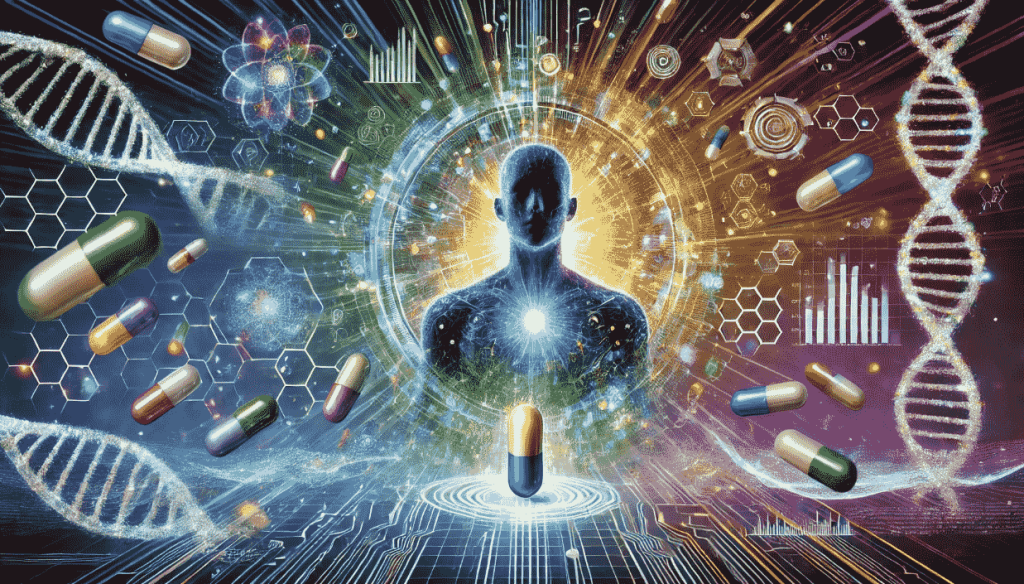
Biohacking supplements: Which one and when to use them Biohacking supplements have become a cornerstone for individuals seeking to enhance their physical and mental performance, longevity, and overall wellness. Whether you’re a seasoned biohacker or just starting your biohacking journey, understanding the role of these supplements can transform your health beyond conventional methods. In this guide, we explore the best biohacking supplements, their benefits, and how to integrate them effectively into your routine. Join our Online Workshops: What are biohacking supplements? Biohacking supplements are scientifically formulated products designed to optimize various aspects of your health and well-being. Unlike traditional dietary supplements, these products target specific biological pathways to enhance cellular energy production, cognitive function, and overall health. Key features of biohacking supplements include: Targeted functionality: Designed to help specific areas like brain health, energy metabolism, or immune system support. Advanced formulations: Incorporate bioavailable ingredients for maximum absorption and efficacy. Holistic impact: Promote health beyond surface-level benefits, focusing on longevity and cellular repair. Benefits of biohacking supplements Biohacking supplements provide a range of benefits that cater to different health goals. Here are some of their most notable advantages: 1. Longevity and Cellular Health Supplements like resveratrol and nicotinamide riboside (NAD precursors) are known to support cellular renewal and combat oxidative stress, key factors in aging. Studies suggest that boosting NAD levels can improve mitochondrial function and increase life expectancy. 2. Enhanced Cognitive Function Nootropics like lion’s mane, B vitamins, and omega-3 fatty acids play a crucial role in improving brain function, memory, and focus. These supplements promote the production of brain-derived neurotrophic factor (BDNF), essential for neurogenesis and mental performance. 3. Optimized Energy Levels Key supplements like CoQ10, magnesium, and nicotinamide adenine dinucleotide (NAD) enhance energy production at the cellular level, helping you maintain peak physical and mental performance. Athletes and busy professionals often use these supplements to sustain their demanding routines. 4. Cardiovascular Health Omega-3 fatty acids, CoQ10, and curcumin are widely recognized for their role in supporting heart health and regulating blood pressure. These supplements reduce inflammation and oxidative stress, promoting a healthier circulatory system. 5. Immune System Support Vitamin C, probiotics, and adaptogens like ashwagandha strengthen immune defenses by supporting gut health and reducing stress. Probiotics, found in fermented foods, help balance gut microbiota, crucial for overall immunity. The best biohacking supplements Biohacking Supplements for Weight Loss Supplements like green tea extract, omega-3 fatty acids, and curcumin aid in boosting metabolism and burning fat. Probiotics support gut health, which is directly linked to weight management. Pairing these supplements with intermittent fasting enhances their efficacy. Biohacking Supplements for Height Growth While height is largely determined by genetics, supplements like calcium, vitamin D, and amino acids can support bone health and growth during developmental years. Adequate magnesium intake ensures proper calcium absorption, contributing to stronger bones. Stress and Anxiety Relief Adaptogens like ashwagandha and supplements promoting melatonin production, such as magnesium and vitamin B6, help regulate stress hormones and improve sleep patterns. Enhanced sleep quality directly impacts stress management and mental clarity. How to choose the best biohacking supplements Selecting high-quality supplements is critical to achieving your health goals. Here’s what to look for: Scientifically Backed Ingredients Opt for supplements with clinically tested ingredients, such as resveratrol, CoQ10, and nicotinamide riboside. High Bioavailability Ensure the supplement is formulated for maximum absorption. For example, liposomal formulations are highly bioavailable. Trusted Brands Choose products from reputable manufacturers with transparent sourcing and testing practices. Individual Goals Match supplements to your specific needs, such as weight loss, brain function, or cardiovascular health. Integrating biohacking supplements into your routine To effectively integrate biohacking supplements into your routine and maximize their benefits, it is essential to follow a few best practices. Start by establishing a baseline through blood tests or consultations with a healthcare professional to assess your current health and identify any deficiencies, such as magnesium or omega-3 fatty acids, that supplements can address. Combine supplements with proven biohacking techniques like red light therapy, intermittent fasting, or cryotherapy for enhanced results. For instance, pairing CoQ10 with exercise can improve mitochondrial energy production. Consistency is key, so incorporate supplements into your daily routine to achieve sustained benefits—take probiotics with meals and magnesium before bed for optimal effects. Finally, track your progress using health monitoring apps to evaluate improvements in sleep, energy levels, and cognitive function. Adjust dosages as needed based on your results and expert advice. Start your biohacking journey with supplements Biohacking supplements offer a powerful way to enhance your physical and mental performance, support longevity, and achieve optimal health. By understanding their benefits and integrating them effectively into your routine, you can biohack your way to better wellness and performance. Whether you’re looking to boost energy levels, improve brain function, or support cardiovascular health, there’s a biohacking supplement designed to help you reach your goals. Take the first step today by identifying your health priorities and choosing the best biohacking supplements tailored to your needs. With consistency, the right supplements, and complementary biohacking techniques, you can unlock your body’s full potential. FAQ Subscribe to the FOREVEROLIMUS Newsletter Sign up to join 500,000+ other subscribers and receive regular emails on neuroscience, health and science-related topics.
Biohacking for women: a comprehensive approach to optimal health and wellness
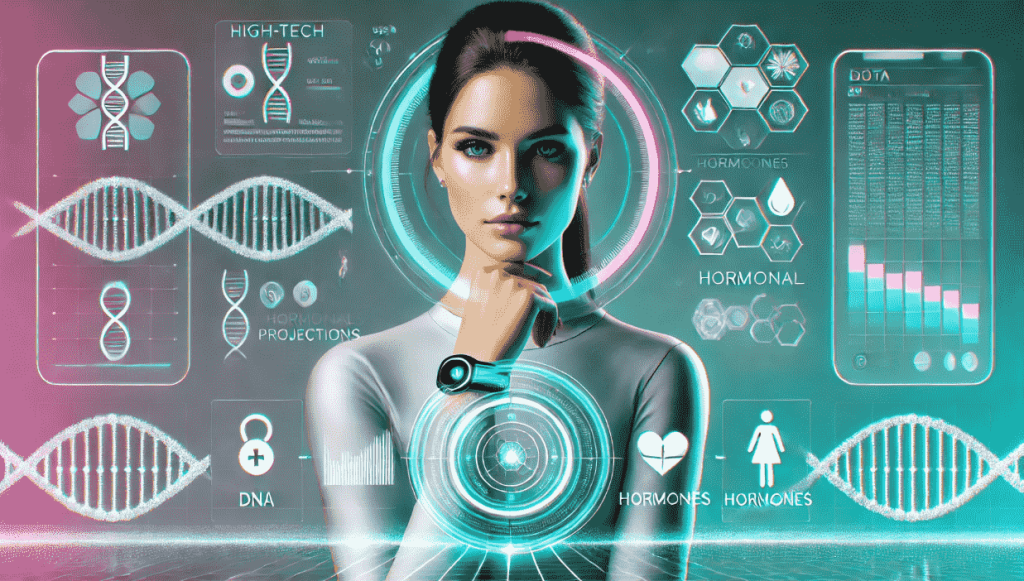
Biohacking for women: a comprehensive approach to optimal health and wellness Biohacking, at its core, involves making strategic, often science-based tweaks to your lifestyle to improve physical, mental, and emotional well-being. While the practice has gained significant popularity over the last decade, many people don’t realize that biohacking for women can involve unique considerations tied to hormonal fluctuations, life stages, and specific health concerns. Join our Online Workshops: Understanding the concept of biohacking for women Biohacking is more than just a trend—it’s a growing movement that advocates for informed self-experimentation. Whether you’re trying to balance hormones, improve mental clarity, or increase energy levels, biohacking techniques can help you optimize health by making targeted lifestyle changes. Unlike one-size-fits-all approaches, biohacking empowers you to explore personalized strategies based on your unique physiology. Why women’s physiology matters in biohacking Women undergo monthly hormonal changes tied to the menstrual cycle, with fluctuations in estrogen and progesterone influencing everything from mood to metabolic rate. Research suggests that up to 80% of women experience PMS symptoms at some point in their lives, underscoring the importance of hormone-aware strategies. Moreover, women face additional milestones—pregnancy, perimenopause, and menopause—all of which can affect energy levels, weight management, and mood. Tailoring strategies by life stage Puberty and early adulthood: Laying a foundation for healthy habits like balanced nutrition and regular exercise can set the stage for lifelong wellness. Reproductive years: Addressing PMS, painful periods, hormonal imbalances, and potential chronic conditions like PCOS (polycystic ovary syndrome) requires more targeted interventions. Perimenopause and menopause: These phases bring about hormonal changes that can affect bone density, cognitive function, and sexual health. Core biohacking principles for women Regardless of age or health status, there are essential strategies every female biohacker can adopt. These foundational principles serve as the bedrock upon which more advanced biohacks are built. Data tracking with wearables Technological advancements, such as the Oura Ring and other wearable devices, allow women to monitor important metrics like sleep quality, resting heart rate, and circadian rhythms. These tools simplify the process of collecting evidence-based data, offering insights that can guide informed decisions about diet, exercise, and sleep optimization. Stress management and mindfulness Chronic stress elevates cortisol, the body’s primary stress hormone, which can lead to weight gain, mood swings, and decreased cognitive function. Techniques like guided meditations, yoga, and breathwork have shown efficacy in reducing anxiety and promoting mental clarity. In fact, a study published in the Journal of the American Medical Association (JAMA) indicates that mindful practices can significantly reduce stress-related symptoms and improve overall well-being. Lifestyle changes: a holistic perspective A successful biohacking plan goes beyond singular fixes and involves a comprehensive lifestyle approach. Optimizing sleep habits, addressing nutritional needs, and managing stress collectively form the basis for women’s health. This broad-based approach is essential for long-term results and addresses issues like hormonal balance and metabolic regulation. Biohacking diet for women Nutrition is a cornerstone of women’s health, influencing everything from hormone production to gut microbiome diversity. Tailoring your diet to your unique physiology can have a profound impact on your energy levels, weight management, and overall well-being. Balancing macronutrients Protein: Aim for 1.2–1.6 grams of protein per kilogram of body weight, focusing on lean sources such as fish, poultry, beans, and legumes. Healthy fats: Incorporate avocados, nuts, seeds, and olive oil for essential fatty acids that aid in hormone production. Complex carbohydrates: Opt for whole grains, legumes, and vegetables to help stabilize blood sugar levels and support gut microbiome health. Hormone-friendly foods Cruciferous vegetables (broccoli, kale, cauliflower) can support estrogen metabolism. Flaxseeds and chia seeds provide phytoestrogens that may help moderate hormonal imbalances. Fermented foods (kimchi, sauerkraut, kefir) bolster gut health, which plays a role in hormone balance and immune function. Intermittent fasting, cycle syncing, and more While intermittent fasting is a popular biohack, women often benefit from more nuanced approaches. Shorter fasting windows—such as 14:10 or 16:8—may be more suitable for maintaining hormonal balance. Additionally, cycle syncing your diet—adjusting caloric intake or nutrient emphasis depending on the phase of your cycle—can help mitigate PMS symptoms and promote optimal hormonal health. Exercise and movement Physical activity is a well-established factor in longevity, cardiovascular health, and stress relief. However, women should be mindful of how hormonal changes might affect workout performance and recovery. Strength training for bone health Women naturally face a higher risk of osteoporosis, particularly post-menopause. Incorporating resistance training at least twice a week helps maintain bone density and muscle mass. Pilates, for instance, can be a gentle yet effective way to build core strength and flexibility. High-intensity interval training (HIIT) If your schedule is tight and you’re looking to boost energy levels and cognitive function, HIIT offers a time-efficient solution. Short bursts of intense effort followed by brief rest intervals can improve cardiovascular health, metabolism, and overall fitness in less time compared to traditional endurance workouts. Balancing intense workouts with restorative practices Overtraining or ignoring rest can lead to hormonal imbalances and chronic stress. Incorporate yoga, gentle stretching, and mindfulness sessions to promote healing, reduce inflammation, and support hormonal health. Sleep optimization for women Circadian rhythms govern vital processes such as hormone secretion, cell regeneration, and metabolism. Disrupted sleep can contribute to insulin resistance, weight gain, and even mood disorders. Blue light exposure and bedtime routines Minimizing screen time before bed can substantially improve sleep quality. Exposure to artificial blue light suppresses melatonin, the hormone that regulates the sleep-wake cycle. Using blue light-blocking glasses or installing apps that reduce blue light emission can promote deeper, more restorative sleep. Improving sleep quality with wearables Wearables such as the Oura Ring monitor sleep stages, heart rate variability, and nighttime movements. By examining daily sleep data, you can make targeted adjustments—like going to bed earlier or avoiding caffeine in the afternoon—to enhance overall well-being. Addressing chronic conditions and stress hormone imbalances Research indicates that chronic sleep deprivation is linked to increased risks of chronic diseases, including cardiovascular issues and metabolic disorders. By prioritizing sleep and utilizing biohacks like aromatherapy, breathwork, and
11 best biohacking books for beginners and experts
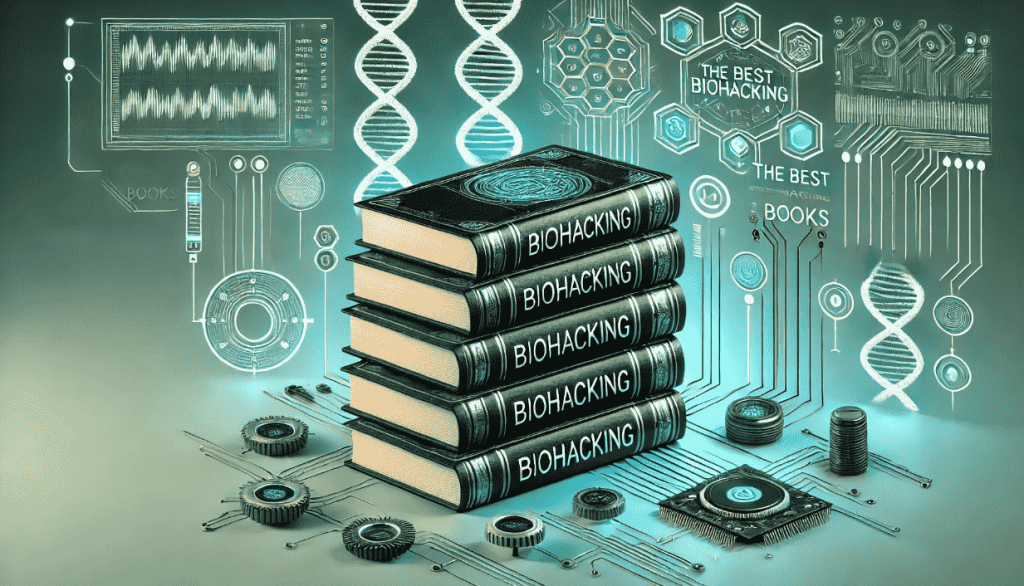
11 best biohacking books for beginners and experts Biohacking involves optimizing one’s health and performance through various techniques and lifestyle changes. For those interested in delving deeper into this subject, several books offer comprehensive insights. Here are some of the top biohacking books: Join our Online Workshops: Foreverolimus: The rise of biohacking and senolytics Author: Viktor Simunovic This book is a comprehensive exploration of the scientific advancements, ethical considerations, and societal implications of biohacking and longevity therapies. Viktor Simunović delves deeply into groundbreaking topics like biomarkers, senolytics, CRISPR, and the conceptual leap to “Foreverolimus,” a pharmaceutical marvel aimed at revolutionizing aging and health optimization. https://www.amazon.com/dp/B0DNKQPCBX Boundless: Upgrade your brain, optimize your body & defy aging Author: Ben GreenfieldA comprehensive guide offering strategies to enhance mental and physical performance, focusing on nutrition, exercise, and lifestyle adjustments to promote longevity and vitality.https://www.amazon.com/Boundless-Upgrade-Brain-Optimize-Aging/dp/1628603976 Lifespan: Why we age—and why we don’t have to Author: David SinclairExplores the science behind aging and presents insights on how to slow down or even reverse the aging process through lifestyle interventions and emerging technologies.https://www.amazon.com/Lifespan-Why-Age_and-Dont-Have/dp/1501191977 The bulletproof diet Author: Dave AspreyIntroduces a high-fat, low-carb diet designed to boost energy, enhance cognitive function, and promote weight loss, based on Asprey’s personal biohacking experiments.https://www.amazon.com/Bulletproof-Diet-Become-Leaner-Smarter/dp/162336518X Why we sleep: Unlocking the power of sleep and dreams Author: Matthew WalkerDelves into the critical importance of sleep and its profound impact on health, learning, mood, and longevity, while offering tips to improve sleep quality.https://www.amazon.com/Why-We-Sleep-Unlocking-Dreams/dp/1501144316 The 4-hour body Author: Tim FerrissProvides unconventional advice on rapid fat loss, improved sex, and becoming superhuman, based on extensive research and self-experimentation, aiming to optimize various aspects of life.https://www.amazon.com/4-Hour-Body-Uncommon-Incredible-Superhuman/dp/030746363X The awakened ape: A biohacker’s guide to evolutionary fitness, natural ecstasy, and stress-free living Author: Jevan PradasCombines evolutionary biology with practical advice to achieve optimal health and happiness, advocating for a return to ancestral lifestyle practices.https://www.amazon.com/Awakened-Ape-Biohackers-Evolutionary-Stress-Free/dp/1535183407 Super human: The bulletproof plan to age backward and maybe even live forever Author: Dave AspreyShares techniques to slow down aging and enhance quality of life, aiming for longevity through biohacking practices and technological interventions.https://www.amazon.com/Super-Human-Bulletproof-Backward-Forever/dp/0062882821 Breath: The new science of a lost art Author: James NestorInvestigates the science of breathing, revealing how slight adjustments in breathing techniques can improve health, athletic performance, and overall well-being.https://www.amazon.com/Breath-New-Science-Lost-Art/dp/0735213615 The oxygen advantage Author: Patrick McKeownIntroduces breathing techniques aimed at improving health, weight loss, and athletic performance, emphasizing the benefits of proper oxygen utilization.https://www.amazon.com/Oxygen-Advantage-Scientifically-Breathing-Techniques/dp/0062349473 The biohacker’s handbook Authors: Olli Sovijärvi, Teemu Arina, Jaakko HalmetojaA comprehensive guide covering various aspects of biohacking, including sleep, nutrition, exercise, work, and the mind, with practical tips to enhance overall well-being.https://www.amazon.com/Biohackers-Handbook-Upgrade-Yourself-Potential/dp/9527241070 Subscribe to the FOREVEROLIMUS Newsletter Sign up to join 500,000+ other subscribers and receive regular emails on neuroscience, health and science-related topics.
Biohacking for weight loss. How to do it effectively?
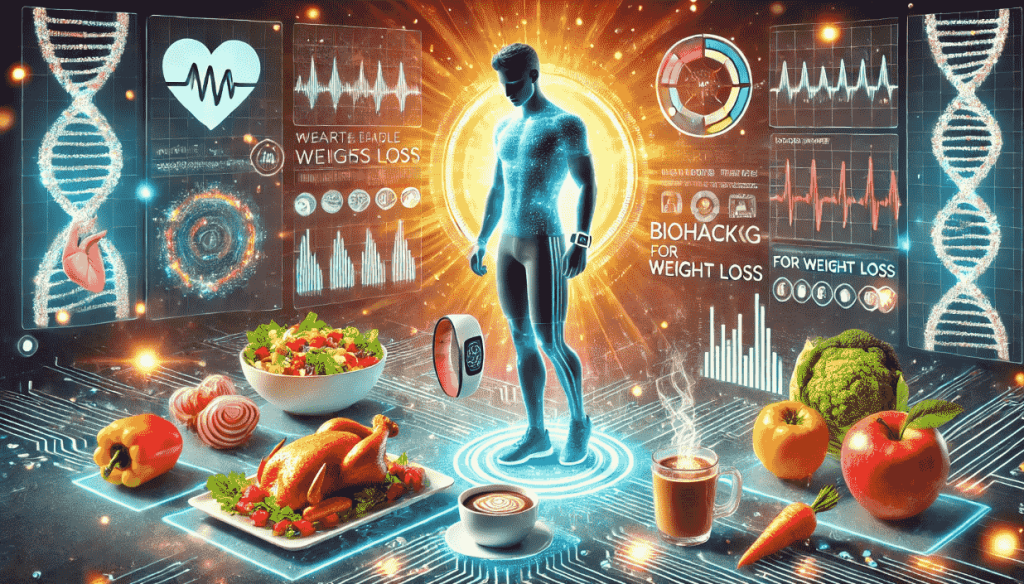
Biohacking for weight loss. How to do it effectively? Biohacking for weight loss is an emerging trend that combines biology, technology, and self-experimentation to optimize the body for better health and efficient fat burning. Essentially, it’s about using science-driven strategies—ranging from wearable tech to dietary tweaks—to achieve results faster and more sustainably. It’s a comprehensive approach that merges traditional health advice with cutting-edge tools to help you lose weight and keep it off. Why does biohacking matter for weight loss? Studies show that around 39% of adults worldwide are overweight, and 13% are obese according to the World Health Organization. With these statistics on the rise, many individuals are searching for methods that go beyond standard dieting. Biohacking offers a more personalized, data-driven, and holistic strategy to weight management. From intermittent fasting and nutrient timing to high-tech gadgets and hormone balancing, biohacking can provide deep insights into your body’s unique needs. Join our Online Workshops: Understanding the science behind biohacking To appreciate how biohacking can improve metabolic rate, it’s useful to explore the science behind it. Metabolism is the process by which the body converts food into energy. When we talk about how biohacking improves metabolic rate, we’re focusing on techniques that enhance the efficiency of this conversion, often by optimizing hormones like insulin, leptin, and ghrelin. Insulin: This hormone regulates blood sugar levels. Chronic high insulin can lead to insulin resistance, making weight loss more challenging. Biohacking methods like intermittent fasting improve insulin sensitivity, so the body uses stored fat more effectively. Leptin: Known as the “satiety hormone,” leptin signals the brain when you’re full. Dysregulation here can lead to overeating. Biohacking your leptin response might involve improving sleep patterns and reducing processed foods. Ghrelin: Dubbed the “hunger hormone,” ghrelin spikes when you’re hungry. Strategies like mindful eating and balanced nutrient intake can help keep ghrelin levels in check. Modern biohackers also leverage data and personalized approaches to optimize weight loss. Wearables like continuous glucose monitors and sleep trackers provide real-time insights. DNA testing services can reveal genetic predispositions that influence metabolism and food sensitivities. By translating this data into actionable steps—whether it’s adjusting macros or changing workout intensity—biohackers can accelerate progress and maintain more consistent results. Setting realistic weight loss goals Before diving into advanced biohacking strategies, it’s crucial to set realistic targets because many people overestimate how quickly they can lose weight, leading to frustration and burnout. Determine your ‘why’: Are you trying to improve your energy levels, fit into a certain clothing size, or boost overall health? A strong reason behind your goal ensures motivation remains high. Recommended rate of weight loss: Health experts suggest losing about 0.5 to 1 kilogram (1 to 2 pounds) per week. This rate helps maintain muscle mass and prevents metabolic slowdown. Track progress: Using biohacking tools like body composition scales or mobile apps allows you to see subtle changes in fat percentage, muscle mass, and water retention. Remember, weight loss is not a one-size-fits-all journey. Your baseline metabolism, hormonal balance, and lifestyle factors are unique. Start with achievable goals, and adjust them as you gain insights from your biohacking experiments Optimizing sleep for fat burn One of the most overlooked factors in weight loss is the power of high-quality rest. Sleep hacks for better weight loss often involve regulating hormones like melatonin and cortisol. Research shows that inadequate sleep disrupts metabolic functions and increases cravings for high-calorie foods. Blue light blocking: Exposure to screens at night can suppress melatonin production, making it harder to fall asleep. Blue light–blocking glasses and turning off electronics at least 30 minutes before bed can improve sleep quality. Consistent bedtime: Maintaining a regular sleep schedule trains your circadian rhythm. This consistency helps optimize hormone release, supporting a healthier metabolism. Intermittent fasting methods Intermittent fasting (IF) has gained immense popularity for its ability to improve insulin sensitivity and accelerate fat adaptation. When exploring best intermittent fasting for quick weight loss, you’ll find several protocols: 16/8: Fast for 16 hours and eat within an 8-hour window. This flexible approach can fit various lifestyles. 5:2: Eat normally five days a week, then limit calories (around 500–600) on two non-consecutive days. OMAD (One Meal a Day): A more extreme method, OMAD requires eating one large meal daily, typically within a 1- to 2-hour window. IF works by managing insulin levels and giving the digestive system time to rest. Studies suggest it can also improve mental clarity, energy levels, and overall metabolic health. Nutrient timing and meal planning Meal timing biohacks to lose weight revolve around when and how you consume your macronutrients (carbs, proteins, and fats). Eating certain foods at specific times can aid fat burn or support workout recovery. Carb backloading: Consuming most of your carbs later in the day can stabilize blood sugar levels and optimize fat burning during the morning and afternoon. Protein pacing: Distributing protein intake throughout the day—rather than consuming it all in one meal—can improve muscle synthesis and satiety. Macro balancing: Diets like the ketogenic diet (high fat, moderate protein, low carb) or balanced macros (40/30/30) can be beneficial, depending on your metabolic profile. Cold therapy and thermogenesis Cold exposure is another intriguing method within biohacking circles. Cold exposure therapy for weight loss works by activating brown adipose tissue (BAT), which can increase metabolic rate. Cold showers: A quick, cost-effective way to get started with cold therapy. Even just 30 seconds at the end of your warm shower can help. Cryotherapy: More advanced cryotherapy chambers expose the body to extremely low temperatures for short periods, potentially boosting calorie burn and enhancing recovery. Research on cold therapy is still evolving, but initial findings suggest it can complement other weight loss strategies by stimulating thermogenesis and fat oxidation. Hormone optimization How to balance hormones for better weight loss is a frequent concern among those who struggle to lose weight, even with diet and exercise. Hormones like cortisol, thyroid hormones, and testosterone play pivotal roles in metabolism. Cortisol management: Chronic stress elevates cortisol, encouraging fat
The rise of biohacking: Why is it trending so much?
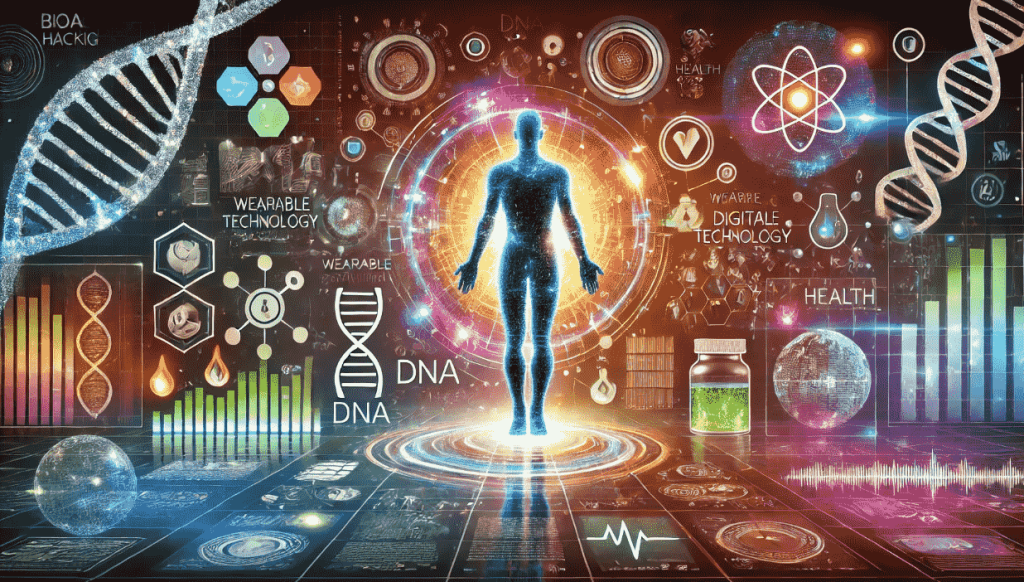
The rise of biohacking: Why is it trending so much? In a world increasingly defined by data, connectivity, and self-optimization, a new paradigm of health and wellness has taken center stage—biohacking. Biohacking involves applying scientific principles, cutting-edge technology, and self-experimentation to improve one’s physical, mental, and even emotional performance. While it may sound like a concept borrowed straight from science fiction, biohacking is no longer a fringe hobby. Instead, it has evolved into a global movement, reshaping how we view healthcare, longevity, and human potential. Join our Online Workshops: What is biohacking and why is it trending now? At its core, biohacking is about transcending traditional medical boundaries and taking a proactive, hands-on approach to personal well-being. Unlike conventional healthcare—often perceived as reactive and impersonal—biohacking puts the individual in the driver’s seat. By leveraging wearables, genetic testing, data analytics, and open-access scientific resources, people can now tailor their health strategies as precisely as a custom suit. This personalized medicine model resonates with the era of on-demand information and hyper-customization, making biohacking’s appeal almost inevitable. A major impetus behind the surge in popularity is technology’s rapid advancement. The global wearable technology market, forecasted by Grand View Research to reach $265.4 billion by 2028, has democratized access to real-time health data. Gadgets like the Oura Ring or Whoop Strap monitor sleep quality, heart rate variability (HRV), and other biomarkers, enabling users to optimize their routines. Continuous glucose monitors, once confined to clinical settings, now help users fine-tune nutrition and metabolic health. Meanwhile, consumer genetic testing services such as 23andMe and microbiome analysis platforms like Viome bring once-exclusive biological insights into the mainstream at relatively low cost. The cultural shift toward self-empowerment and longevity Biohacking also aligns with an overarching cultural shift: people are no longer satisfied just living longer—they want to live better. Longevity initiatives, supported by organizations like the Methuselah Foundation, are on the rise as individuals seek to enhance their “healthspan,” not just their lifespan. The Longevity Summit and other conferences highlight the global fascination with improving quality of life through precision health interventions. Biohacking’s ethos dovetails perfectly with this movement, providing a toolkit to those who see aging not as an inevitability but as a challenge to overcome. The surge in interest also reflects a philosophical pivot toward autonomy. Traditional healthcare systems can feel restrictive, providing generalized advice that may not fit everyone’s unique biology. By contrast, biohacking encourages experimentation, risk-taking (within reason), and continuous feedback loops. For many, this sense of control and empowerment is a key driver of biohacking’s allure. Democratization of science: Knowledge at your fingertips One of the most significant contributors to biohacking’s rise is the democratization of scientific knowledge. Open-access journals, educational platforms, online courses, and health forums now allow anyone with an internet connection to access and understand the latest research. This unprecedented availability of data and educational resources breaks down barriers that once confined scientific insight to universities, elite labs, and healthcare institutions. Communities dedicated to biohacking—such as the Quantified Self movement and various Reddit groups—act as global brainstorming hubs. Experienced biohackers share protocols, troubleshoot others’ experiments, and critique newly released studies, accelerating collective learning. Instead of medical professionals operating as gatekeepers of information, we see a vibrant, decentralized network of enthusiasts pushing the envelope of what’s possible. Popular biohacking practices and tools Biohacking’s scope is broad, encompassing everything from simple lifestyle tweaks to advanced, tech-driven interventions. Nutritional Biohacking and Intermittent Fasting:Intermittent fasting, ketogenic diets, and other strategic eating patterns aim to stabilize blood sugar, boost cognitive function, and improve metabolic flexibility. Studies suggest that certain fasting protocols can enhance insulin sensitivity and reduce inflammation—outcomes that align with the biohacker’s pursuit of longevity and peak performance. Nootropics and Cognitive Enhancement:Cognitive performance lies at the heart of many biohacking endeavors. Nootropics—sometimes called “smart drugs”—include everything from L-theanine and caffeine to more experimental compounds and prescription medications used off-label. They’re designed to sharpen focus, improve memory, and enhance creativity, appealing to high-performers in tech, academia, and beyond. Sleep Optimization:The importance of restorative sleep cannot be overstated. Wearables and apps that measure sleep stages, HRV, and movement patterns help biohackers identify strategies—such as controlling blue light exposure, adjusting dietary factors, or practicing relaxation techniques—that yield deeper, more regenerative rest. Genetic and Microbiome Testing:Personalized medicine finds its most concrete expression in genetic and gut microbiome analyses. By identifying genetic predispositions to certain diseases or understanding how specific nutrients interact with one’s microbiome, individuals can devise ultra-targeted health interventions. CRISPR gene-editing technology is even on the horizon, potentially offering ways to correct genetic vulnerabilities before they manifest as health issues. Biofeedback and Advanced Wearables:Devices that provide biofeedback—real-time insights into physiological responses—allow users to manage stress, anxiety, and emotional states more effectively. Heart rate variability monitors, EEG headbands, and even implantable chips that store personal data exemplify how deeply digital health tools have woven themselves into everyday life. From niche hobby to global phenomenon: Community and social influence The rapid growth of biohacking is inseparable from its strong community component. Online forums, global conferences, and local meetups transform isolated experiments into collective learning experiences. Influential figures like Dave Asprey, often called the “father of biohacking,” amplify best practices and emerging trends to millions of followers. This combination of expert insight, peer support, and crowd-sourced innovation ensures that biohacking isn’t just a lone pursuit—it’s a movement fueled by shared curiosity and collective intelligence. Ethical and regulatory considerations: Navigating uncharted terrain While biohacking opens exciting possibilities, it also breaks new ground ethically and regulatorily. Unregulated supplements, off-label drug use, and experimental gene editing can put individuals at risk, especially without medical guidance. As biohacking becomes more mainstream, expect mounting pressure for clearer guidelines, certification programs, and regulatory frameworks that encourage responsible experimentation while protecting public safety. Misinformation is another critical hurdle. With so many products claiming miracle results, consumers must approach new interventions skeptically, seeking evidence-based advice. Over time, reliable resources, third-party testing, and industry standards will hopefully separate legitimate breakthroughs from marketing hype. Bridging science fiction and reality
The ultimate guide to biohacking resources: where to find trusted information
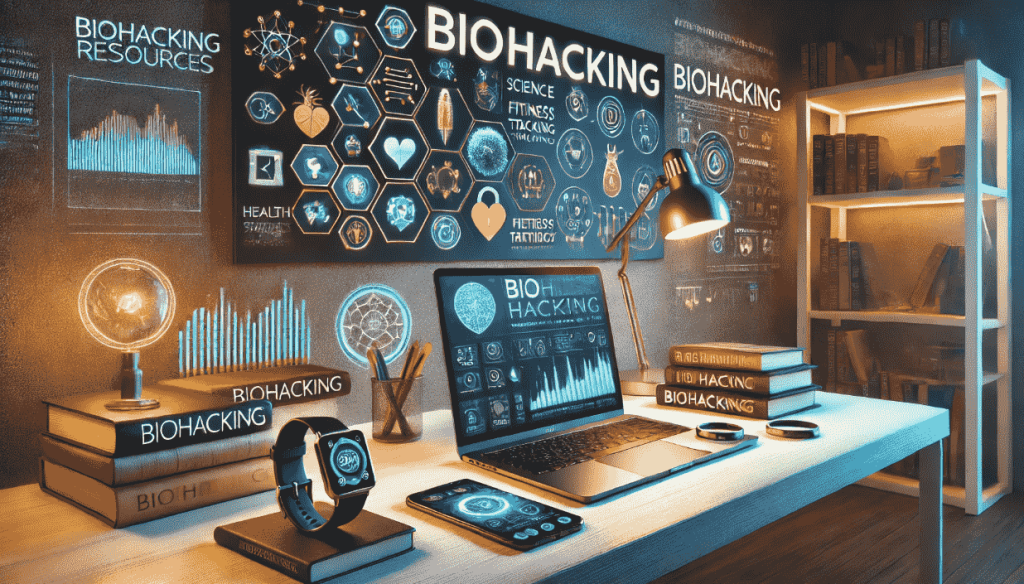
The ultimate guide to biohacking resources: where to find trusted information As the global interest in optimizing personal health, longevity, and performance continues to grow, more individuals are turning to biohacking as a means of taking control of their biology. Biohacking—often described as the art and science of enhancing one’s physical and cognitive capabilities—is evolving rapidly, fueled by continuous innovations in nutrition, sleep optimization, wearable technology, and mental performance strategies. While the wealth of available information on biohacking is abundant, it can also be overwhelming and sometimes difficult to filter through. Choosing the right biohacking resources matters. Quality information from trusted sources ensures you’re relying on evidence-based practices rather than fads, pseudoscience, or marketing hype. Join our Online Workshops: Books on biohacking Books remain one of the most in-depth and reliable ways to gain foundational knowledge and long-term insights into biohacking. Many are written by seasoned experts who have devoted decades to research, experimentation, and synthesizing complex data into practical strategies. “Foreverolimus: “The Rise of Biohacking and Senolytics” by Viktor Simunovic: This book is a comprehensive exploration of the scientific advancements, ethical considerations, and societal implications of biohacking and longevity therapies. Viktor Simunović delves deeply into groundbreaking topics like biomarkers, senolytics, CRISPR, and the conceptual leap to “Foreverolimus,” a pharmaceutical marvel aimed at revolutionizing aging and health optimization. “Head Strong” by Dave Asprey: Asprey, often hailed as a pioneer of the modern biohacking movement, founded the Bulletproof brand and introduced concepts like Bulletproof Coffee to the mainstream. In Head Strong, he dives deep into mitochondrial health, brain optimization, and cognitive enhancements, offering actionable tips grounded in scientific research. “The 4-Hour Body” by Tim Ferriss: Tim Ferriss, known for his data-driven approach to optimizing various aspects of life, covers a broad range of health hacks. From rapid fat loss and muscle gain to improved sleep and sex drive, Ferriss’s work weaves personal experimentation with scientific literature, inspiring readers to measure, track, and refine their approaches. Websites and blogs for biohacking insights High-quality websites and blogs dedicated to biohacking provide continually updated information, often with links to primary research papers and interviews with experts. Some reputable platforms include: Bulletproof Blog: Connected to Dave Asprey’s brand, it features articles on biohacking techniques, healthy recipes, new supplements, and emerging technologies. Ben Greenfield Fitness: Run by fitness and health expert Ben Greenfield, it offers a broad range of biohacking-related articles, product reviews, and guides. SelfHacked: Provides science-backed articles on nutrition, genetics, and personalized health, helping readers sift through the noise and focus on actionable insights. Podcasts for ongoing biohacking education Podcasts are an excellent medium for staying informed. You can listen on the go, hear directly from leading experts, and dive deep into interviews that break down complex topics. “Bulletproof Radio” (now “The Human Upgrade”) with Dave Asprey: Featuring interviews with scientists, doctors, and performance experts, this podcast covers a wide range of topics, from brain health and nutritional breakthroughs to cutting-edge technologies. “FoundMyFitness” by Dr. Rhonda Patrick: Dr. Patrick’s episodes often focus on the links between diet, genetics, and aging. She dives into the science of longevity, inflammation, and how micronutrients impact performance. “Ben Greenfield Life”: Known for his in-depth discussions and experimental approach, Greenfield interviews researchers, athletes, and health gurus to explore advanced strategies in biohacking and overall wellness. Social media channels for biohacking updates Social media platforms like Instagram, Twitter (X), LinkedIn, and TikTok have become popular channels for quick tips, emerging research highlights, and community interaction. Influencers, doctors, nutritionists, and athletes share concise insights, product reviews, and personal experiments: Twitter (X): Follow experts like Tim Ferriss, Dave Asprey, and Dr. Peter Attia for timely tweets on new studies and supplements. Instagram: Many biohackers share daily routines, meal plans, workout regimens, and wellness tips. Look for verified accounts and credentialed professionals. YouTube: Channels like “Biohackers Lab” or Dr. Rhonda Patrick’s “FoundMyFitness” share video interviews, product reviews, and instructional guides. LinkedIn: Dr. Viktor Simunovic offer his expertise and experience from biohacking world. Biohacking conferences and events In-person and virtual conferences are fantastic opportunities to connect with experts, discover new products, and learn about the latest research. Events like the Biohacker Summit in Europe and the Bulletproof Biohacking Conference in the U.S. have grown in popularity, drawing renowned speakers, scientists, health practitioners, and entrepreneurs. At these events, you can: Attend keynote lectures on cutting-edge research in fields like genetics, wearables, and nootropics. Participate in workshops and demonstrations on everything from breathing techniques to sleep optimization gadgets. Network with like-minded enthusiasts, share experiences, and discover innovative solutions you might not encounter online. Before attending any event, review the speaker lineup, sponsors, and agenda to ensure it aligns with your interests and is backed by credible professionals and organizations. Biohacking communities and forums Online communities and forums provide invaluable opportunities for peer-to-peer learning, discussing the latest trends, and problem-solving. Platforms like Reddit’s r/Biohackers, Biohacker’s Handbook Community, and the Quantified Self Forums allow users to share personal experiments, troubleshoot common issues (e.g., improving sleep quality), and recommend trusted resources. When engaging in these communities, keep an open mind, but maintain a healthy dose of skepticism. Cross-check anecdotal recommendations with scientific evidence, and understand that what works for one person may not work for you due to individual biochemical differences. Online courses and certifications Online courses and certifications offer structured learning paths, ensuring you gain a comprehensive understanding of biohacking principles rather than just collecting scattered tips. Platforms such as Udemy, Coursera, and Mindvalley frequently host courses by experts with medical, scientific, or wellness backgrounds. Look for courses that: Are taught by qualified instructors with credentials and industry recognition. Offer course outlines, learning outcomes, and citations from reputable journals. Provide interactive elements like Q&A sessions, peer-to-peer discussions, and assignments to ensure practical application of the knowledge. While certifications aren’t always necessary, completing a well-reviewed course can boost your confidence in implementing biohacking strategies safely and effectively. Biohacking apps and trackers Technology plays a central role in modern biohacking. Wearable devices, smartphone apps, and other tracking tools are
The best biohacking devices and wearables. We tested them for you.
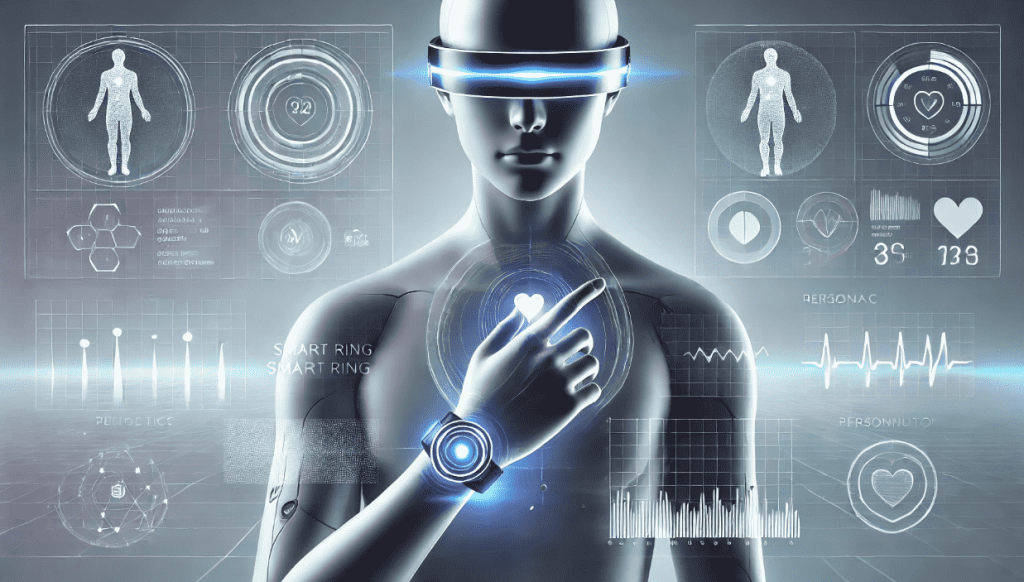
The best biohacking devices and wearables. We tested them for you. As the world of health and wellness continues to evolve, cutting-edge technology is taking center stage—helping us optimize our bodies, sharpen our minds, and push our personal boundaries. From wearable trackers that dig deep into our sleep cycles to handheld monitors that decode our metabolic data, biohacking devices have become key allies in our quest for better performance, longevity, and overall well-being. In this article, we’ve sifted through the latest gadgets and gear, tested them thoroughly, and curated a selection of the best products out there. So get ready to discover the tools that can help you fine-tune your life and elevate your body’s natural capabilities like never before. Join our Online Workshops: Sleep optimization Whoop Strap 4.0 The Whoop Strap 4.0 is a cutting-edge wearable device designed to provide in-depth insights into sleep, recovery, and overall performance. Its advanced features and personalized analytics make it a standout tool for sleep optimization. Personalized Insights: Whoop’s ability to tailor recommendations based on individual data ensures that users receive guidance specific to their unique sleep patterns and recovery needs. Holistic Approach: By integrating sleep tracking with recovery and strain analysis, Whoop offers a comprehensive view of how sleep impacts overall performance and health. User-Friendly Design: The strap’s minimalist, screen-free design encourages 24/7 wear, ensuring continuous data collection without distractions. Actionable Data: Whoop translates complex metrics into understandable scores and recommendations, empowering users to make meaningful changes to their sleep routines. Oura Ring Generation 3 The Oura Ring Generation 3 is a discreet and sophisticated wearable designed to provide comprehensive insights into sleep patterns, recovery, and overall health. Its advanced sensors and user-friendly interface make it a leading choice for individuals aiming to optimize their sleep and well-being. Accuracy: The Oura Ring’s precise sensors provide reliable data on sleep stages and quality, enabling users to make informed adjustments to their routines. User-Friendly Interface: The accompanying app presents data in an accessible manner, offering actionable insights and personalized recommendations for sleep improvement. Discreet Design: Its ring form factor ensures comfort and minimal intrusion, allowing for continuous wear without the bulk of traditional wrist-worn devices. Holistic Health Monitoring: By integrating sleep data with activity and physiological metrics, the Oura Ring offers a comprehensive view of health, emphasizing the critical role of sleep in overall well-being. Stress and mood regulation Apollo Neuro The Apollo Neuro is an innovative wearable device designed to help users manage stress and regulate mood through gentle vibrations that stimulate the nervous system. Developed by neuroscientists and physicians, it aims to improve overall well-being by enhancing the body’s resilience to stress. Non-Invasive Approach: Unlike pharmacological interventions, Apollo Neuro offers a drug-free method to manage stress and mood, reducing the risk of side effects. Ease of Use: Its wearable design ensures that users can incorporate stress management into their daily routines seamlessly, whether at work, home, or during travel. Scientific Foundation: Developed based on extensive research in neuroscience, the device’s efficacy is supported by clinical studies demonstrating its positive impact on stress resilience and HRV. Personalization: The ability to tailor programs to individual needs allows for a customized experience, enhancing the effectiveness of interventions for stress and mood regulation. Muse S Headband The Muse S Headband is an advanced wearable device designed to enhance meditation practices and monitor sleep patterns. By utilizing electroencephalography (EEG) technology, it provides real-time feedback on brain activity, heart rate, breathing, and body movements, aiming to improve mental well-being through guided meditation and sleep tracking. Enhanced Meditation Experience: By providing real-time feedback on mental states, the Muse S helps users identify when their minds wander, facilitating a more effective meditation practice that can lead to reduced stress and improved mood. Improved Sleep Quality: The device’s sleep tracking capabilities allow users to monitor and analyze their sleep patterns, enabling them to make informed adjustments to enhance sleep quality, which is closely linked to mood regulation. Personalized Insights: With detailed data on physiological responses, users can gain a better understanding of their stress triggers and develop personalized strategies to manage stress and maintain emotional balance. Metabolic and nutrition tracking Lumen The Lumen Metabolism Tracker is a pioneering handheld device that analyzes your breath to determine your body’s current fuel utilization—whether carbohydrates or fats. By measuring the concentration of carbon dioxide (CO₂) in your exhalation, Lumen provides personalized nutritional guidance aimed at enhancing metabolic flexibility and overall health. Enhanced Metabolic Flexibility: By consistently monitoring and adjusting your diet based on Lumen’s feedback, you can train your body to switch more efficiently between burning fats and carbohydrates, a key component of metabolic health. Weight Management Support: Users have reported weight loss and improved metabolic function by adhering to Lumen’s personalized nutritional guidance, which aligns with individual metabolic states. Behavioral Accountability: The immediate feedback provided by Lumen encourages adherence to dietary plans and fosters greater mindfulness regarding food choices and their metabolic impacts. Nutrisense CGM The Nutrisense Continuous Glucose Monitor (CGM) is an innovative tool designed to provide real-time insights into your blood glucose levels, empowering you to make informed decisions about your diet and lifestyle. By utilizing a minimally invasive sensor placed on the upper arm, Nutrisense offers a comprehensive approach to understanding and optimizing metabolic health. Real-Time Feedback: Nutrisense allows users to see immediate effects of dietary choices and lifestyle habits on glucose levels, facilitating prompt adjustments for better metabolic control. Behavioral Insights: By identifying personal glucose triggers, users can modify behaviors to maintain stable blood sugar levels, reducing risks associated with metabolic disorders. Data-Driven Personalization: The combination of continuous data and expert support enables a customized approach to nutrition and health, moving away from generic advice to strategies that work for the individual. Physical performance Garmin Forerunner 945 The Garmin Forerunner 945 is a premium GPS smartwatch tailored for dedicated athletes, particularly runners and triathletes. It offers an extensive array of features designed to monitor and enhance physical performance, making it a standout choice for those seeking comprehensive training
Upcoming biohacking conferences in 2025

Upcoming biohacking conferences in 2025 Biohacking is the practice of making small, incremental changes to one’s lifestyle, diet, and habits to optimize health, well-being, and performance. Rooted in the intersection of biology, technology, and personal development, biohacking ranges from simple methods like dietary adjustments and meditation to advanced interventions involving wearables, genetic testing, and even implantable devices. Join our Online Workshops: What are biohacking conferences? Biohacking conferences are dynamic events where experts, enthusiasts, and innovators gather to share knowledge, showcase technologies, and explore the latest trends in human optimization. These conferences offer keynote speeches from leading biohackers, interactive workshops, exhibitions of cutting-edge gadgets, and networking opportunities with like-minded individuals. Attendees leave armed with actionable insights and inspiration to enhance their biohacking journey. Upgrade labs biohacking conference in Austin, Texas Dates: May 28-30, 2025 Location: Fairmont Austin, Austin, Texas, USA Tickets: General Admission: $1,999 VIP Admission: $4,999 Official website Speakers: Dave Asprey: Host of The Human Upgrade™ podcast and creator of Danger Coffee and Upgrade Labs. Teal Swan: New thought leader, bestselling author, and international speaker. Ryan Holiday: Philosopher, marketer, bestselling author, businessman, and podcaster. Hal Elrod: Creator of The Miracle Morning. Dr. Alberto Villoldo: Medical anthropologist, psychologist, and shaman. Hosted by Dave Asprey from Upgrade Labs, this flagship event will feature over 100 biohacking brands and activations and over 3,000 biohacking enthusiasts. The conference agenda includes keynote presentations, panel discussions, workshops, and hands-on demonstrations of cutting-edge biohacking technologies. Participants will explore topics such as brain enhancement, longevity, performance optimization, and mental health. Biohacker summit in Tokyo, Japan Dates: October 10-11, 2025 Location: Dragon Gate in Shibuya, Tokyo, Japan Tickets: Regular: €197 (Early Bird Price; will increase to €497). Spaceship: €897 (Early Bird Price; will increase to €1,270). VIP: €1,270 (Early Bird Price; will increase to €1,970). Reduced: €97 (for students, retirees, veterans, unemployed, and non-profits; requires proof). Video: €97 (live stream and recordings). Official website Speakers: Teemu Arina: Founder of Biohacker Center and curator of Biohacker Summit. Sensei Zen Takai: The Zen Samurai, 16th Generation Samurai & Ninja. Joi Ito: President at Chiba Institute of Technology. Dr. Olli Sovijärvi: Healthspan optimization doctor and lead author of Biohacker’s Handbook & The Resilient Being. Tateki Matsuda: Mixed martial artist, former UFC fighter, with a B.S. in Sports Movement Science and an M.S. in Applied Nutrition. Yogetsu Akasaka: Beatboxing Zen Buddhist monk. Pavel Stuchlik: Founder of NOA|AON, international DJ/producer. Siim Land: Best-selling author, high-performance coach, and biohacking prodigy. Shawn Wells: Biochemist, dietitian, sports nutritionist, and formulation scientist. Momoe: Founder of ZenEating. Satyen Raja: Founder of WarriorSage and leadership mentor for CEOs. Jessica Alana: Mold illness and toxicity specialist, biomedicine expert, and certified health practitioner. With the theme “The Zen of Longevity,” this summit merges Eastern and Western philosophies for holistic well-being. Expect presentations from 45+ experts and immersive experiences designed to cultivate a long, healthy life. Its state-of-the-art exhibition, upgraded dining experiences, and zen-focused events offer an unforgettable dive into the art and science of biohacking. Biohackers world conference and expo: Los Angeles, California Dates: March 29-30, 2025 Location: Los Angeles, California, USA Tickets: General Admission: $148 VIP Experience: $298 Practitioner Pass: $248 Official website Speakers: Clayton Thomas: Founder and CEO at The Root Brands Philipp Samor von Holtzendorff-Fehling: Founder and CEO of Leela Quantum Tech and Quantum Upgrade A hotspot for pioneers in wellness and biohacking, this expo showcases interactive exhibits, groundbreaking technologies, and insightful discussions. It’s a golden opportunity to connect with forward-thinking individuals and explore the latest innovations aimed at transforming human potential. Biohacker expo Miami, Florida Dates: February 28 – March 1, 2025 Location: Miami Airport Convention Center, Miami, Florida, USA Tickets: $595 Official website Speakers: JP Sears: Comedian and emotional healing coach known for his satirical take on wellness culture. Andrew Bustamante: Former CIA operative and expert in espionage and intelligence. Elizabeth Gaines: Health and wellness advocate with a focus on integrative practices. Dr. Anna Cabeca: Renowned gynecologist and women’s health expert. Mark Divine: Former Navy SEAL and founder of SEALFIT, specializing in mental toughness. Dr. Christina Rahm: Scientist and formulator in health and wellness. Mark Certo: Expert in sound therapy and consciousness. Dr. Lauren Leiva: Specialist in functional medicine and biohacking. Ben Azadi: Founder of Keto Kamp and bestselling author. Dedicated to integrative practitioners and enthusiasts, this event focuses on stress management, sleep optimization, and overall well-being. With a hands-on approach, attendees can discover practical tools and strategies to enhance their health and performance. Biohacking days Stuttgart, Germany Dates: April 25 – 27, 2025 Location: Messe Stuttgart, Stuttgart, Germany Official website Speakers: Andreas Breitfeld Dr. Patrick Kramer Nico Airone Attendees with a Biohacking Days ticket will also have access to concurrent events at Messe Stuttgart, including the Yoga & Vegan World and the Slow Food Messe, providing a holistic experience centered on mindful and conscious living and cold exposure sessions, experience guided ice baths designed to strengthen both body and mind. Hack your health conference (KetoCon) Tampa, Florida Dates: November 14-16, 2025 Location: Tampa Convention Center, Tampa, Florida, USA Tickets: General 3-Day Pass: $449 VIP 3-Day Pass: $1,199 Virtual Replay Pass: $199 Official website Speakers: Renee Belz: The Biohacker Babes Lauren Sambataro: The Biohacker Babes Exhibitor Expo Hall: Explore an expo hall featuring more than 100 exhibitors showcasing the latest products and services in the health and wellness industry. Specialty Workshops: Participate in hands-on workshops covering topics such as personalized nutrition, metabolic health, and biohacking techniques. Interactive Experiences: Engage in activities like cooking demonstrations, taste testing, cold plunges, hyperbaric chamber sessions, red light therapy, fitness equipment trials, sauna experiences, and DEXA scans. Networking Opportunities: Connect with like-minded individuals, industry leaders, and innovators shaping the future of health and wellness. The health optimisation summit London, UK Dates: September 13-14, 2025 Location: Business Design Centre, London, UK Tickets: Golden Earlybird Ticket: £199 Loyalty VIP Ticket: £999 NHS, Student, Military & Over 65: £149 Official website Speakers: Gary Brecka Zach Bush MD Jim Kwik JJ Virgin Exhibitor Village: Explore a curated selection of more than 100 cutting-edge brands showcasing